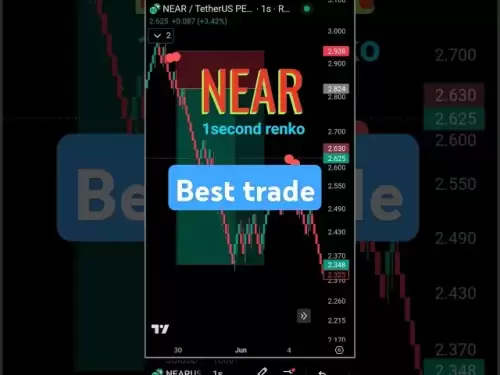-
 Bitcoin
Bitcoin $104,831.6152
-2.14% -
 Ethereum
Ethereum $2,527.5561
-7.78% -
 Tether USDt
Tether USDt $1.0004
0.04% -
 XRP
XRP $2.1431
-3.95% -
 BNB
BNB $654.2081
-1.57% -
 Solana
Solana $144.6495
-8.44% -
 USDC
USDC $0.9998
0.00% -
 Dogecoin
Dogecoin $0.1750
-6.68% -
 TRON
TRON $0.2734
0.07% -
 Cardano
Cardano $0.6365
-6.26% -
 Hyperliquid
Hyperliquid $39.7542
-1.81% -
 Sui
Sui $3.0047
-8.13% -
 Chainlink
Chainlink $13.2543
-6.48% -
 UNUS SED LEO
UNUS SED LEO $9.0669
2.25% -
 Bitcoin Cash
Bitcoin Cash $415.6316
-2.76% -
 Stellar
Stellar $0.2587
-5.42% -
 Avalanche
Avalanche $19.1179
-8.19% -
 Toncoin
Toncoin $2.9603
-6.60% -
 Shiba Inu
Shiba Inu $0.0...01171
-6.89% -
 Hedera
Hedera $0.1537
-7.88% -
 Litecoin
Litecoin $83.8459
-5.21% -
 Polkadot
Polkadot $3.8220
-5.08% -
 Ethena USDe
Ethena USDe $1.0004
-0.02% -
 Monero
Monero $315.4148
-2.86% -
 Dai
Dai $0.9999
0.02% -
 Bitget Token
Bitget Token $4.5249
-3.46% -
 Uniswap
Uniswap $7.2671
-7.46% -
 Pepe
Pepe $0.0...01069
-12.50% -
 Aave
Aave $284.4240
-3.15% -
 Pi
Pi $0.5584
-10.95%
What does fork mean in blockchain? The difference between hard fork and soft fork
A blockchain fork can either split the network into two chains (hard fork) or implement backward-compatible changes (soft fork), shaping the evolution of cryptocurrencies like Bitcoin and Ethereum.
Jun 12, 2025 at 10:49 am
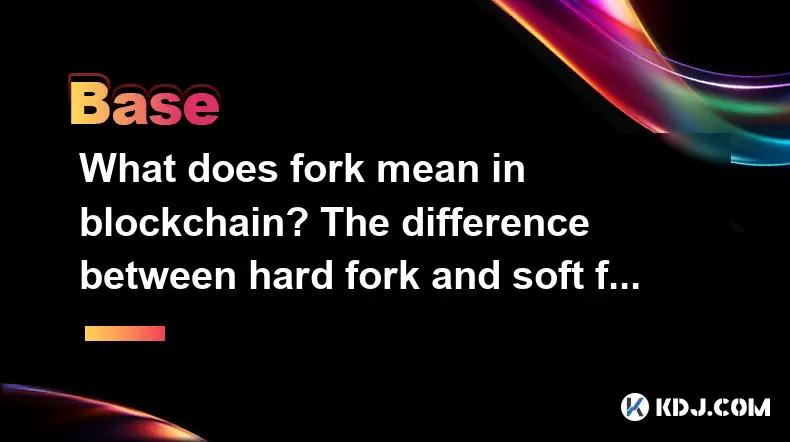
Understanding the Concept of Fork in Blockchain
In the world of blockchain and cryptocurrencies, a fork refers to a change or deviation in the protocol that governs a blockchain network. This change can result in either a split in the chain or a backward-compatible update, depending on the type of fork implemented. A fork essentially means that there is a divergence in the blockchain's path, leading to two potential versions of the ledger — one following the old rules and another adhering to the new ones.
Forks are not only crucial for the evolution of blockchain networks but also serve as tools for resolving disputes among developers, miners, and users regarding the future direction of a cryptocurrency project.
Hard Fork: Definition and Characteristics
A hard fork occurs when a blockchain undergoes a significant protocol change that makes previously invalid blocks and transactions valid (or vice versa), and this change is not backward compatible. As a result, nodes running the old version of the software will reject the new blocks created under the updated rules.
This leads to a permanent split in the blockchain, where the network effectively divides into two separate chains — one continuing with the old protocol and the other operating under the new rules. If both chains continue to be supported by miners and users, they may evolve into two distinct cryptocurrencies. For example, Bitcoin Cash emerged from a hard fork of the original Bitcoin blockchain.
Soft Fork: Definition and Characteristics
Unlike a hard fork, a soft fork introduces changes to the blockchain protocol that are backward compatible. In this case, the new rules are more restrictive than the previous ones, meaning that blocks and transactions validated under the new rules are still accepted by nodes using the older software version.
As long as a majority of miners adopt the new rules, the network remains unified. Users who do not upgrade their software can still interact with the network without issues. Segregated Witness (SegWit) was implemented as a soft fork on the Bitcoin network to increase block capacity without splitting the chain.
Key Differences Between Hard Fork and Soft Fork
The distinction between hard forks and soft forks lies primarily in their compatibility and impact on the network:
- Backward Compatibility: A soft fork maintains compatibility with older nodes, while a hard fork breaks compatibility.
- Chain Split: Only a hard fork can result in a permanent chain split, potentially creating two separate cryptocurrencies.
- Consensus Requirement: A soft fork requires only a majority of miners to enforce the new rules, whereas a hard fork needs nearly all participants to agree and upgrade their software.
- Use Cases: Soft forks are typically used for minor upgrades or optimizations, while hard forks are reserved for major changes or ideological splits within the community.
These differences highlight how each type of fork serves different purposes and carries varying levels of risk and impact on the ecosystem.
Examples of Hard Forks and Soft Forks in Practice
Several well-known cryptocurrencies have undergone both hard forks and soft forks, offering real-world examples of how these mechanisms function.
Bitcoin Cash (BCH): This is perhaps the most famous hard fork of Bitcoin. It occurred in August 2017 due to disagreements over block size limits. Supporters of larger blocks created a new chain that allowed for bigger blocks, aiming to improve transaction speed and reduce fees.
Ethereum Classic (ETC): After the infamous DAO hack in 2016, Ethereum decided to perform a hard fork to reverse the stolen funds. However, some members of the community opposed this decision, continuing to support the original Ethereum chain, which became Ethereum Classic.
SegWit (Bitcoin): Implemented in 2017, SegWit was a soft fork designed to optimize block space by separating signature data from transaction data. It did not cause a split in the chain and was adopted gradually by the network.
These examples illustrate how forks can shape the development and governance of blockchain projects.
How to Participate in a Fork
If you're holding cryptocurrency during a fork, you might receive tokens on the new chain if it results from a hard fork. Here’s how you can participate:
- Ensure your coins are stored in a wallet where you control the private keys. Exchanges often handle forks differently, and some may not support the new chain.
- Keep your wallet software up to date before the fork occurs to ensure compatibility.
- After the fork, check whether the new token has been distributed. You may need to use a specific tool or service to claim your coins on the new chain.
- Be cautious of scams or fake airdrops related to the fork. Always verify information through official channels.
Following these steps ensures that you can safely take advantage of any new assets issued during a fork.
Frequently Asked Questions
- Can a soft fork turn into a hard fork?
While a soft fork itself does not become a hard fork, the implementation of a soft fork may sometimes lead to a hard fork if a portion of the community disagrees with the changes and chooses to create a non-compatible alternative. - Do all forks result in new cryptocurrencies?
No, only hard forks have the potential to create new cryptocurrencies. Soft forks maintain consensus across the network and do not result in a split. - What happens to my coins during a fork?
If you hold coins in a personal wallet during a hard fork, you may receive an equivalent amount of the new token. During a soft fork, your coins remain unaffected as no split occurs. - Who decides when a fork happens?
Forks are typically proposed by developers and require consensus among miners, node operators, and sometimes users. In decentralized systems, no single entity has full control over implementing a fork.
Disclaimer:info@kdj.com
The information provided is not trading advice. kdj.com does not assume any responsibility for any investments made based on the information provided in this article. Cryptocurrencies are highly volatile and it is highly recommended that you invest with caution after thorough research!
If you believe that the content used on this website infringes your copyright, please contact us immediately (info@kdj.com) and we will delete it promptly.
- Dogecoin (DOGE) shows signs of a possible price jump, thanks to a familiar Fibonacci setup. Ethena (ENA), meanwhile, sits in a tricky spot, caught between strong APY rewards and weak technical momentum.
- 2025-06-13 20:20:13
- Ant Group Applies for Stablecoin Licenses in Hong Kong and Singapore
- 2025-06-13 20:20:13
- Snorter Token ($SNORT) Prepares to Revolutionize the Meme Coin Market With Its Feature-Rich Trading Bot
- 2025-06-13 20:20:12
- William Duplessie and John Woeltz Plead Not Guilty to Kidnapping, Assault
- 2025-06-13 20:20:12
- McKeever, Nora. ‘’Faughart Hill’’, Kilmore.
- 2025-06-13 20:15:12
- Bitcoin (BTC) Price Today, June 13: Bitcoin Price Trading Near $107,690 Following a Slight Dip
- 2025-06-13 20:10:11
Related knowledge
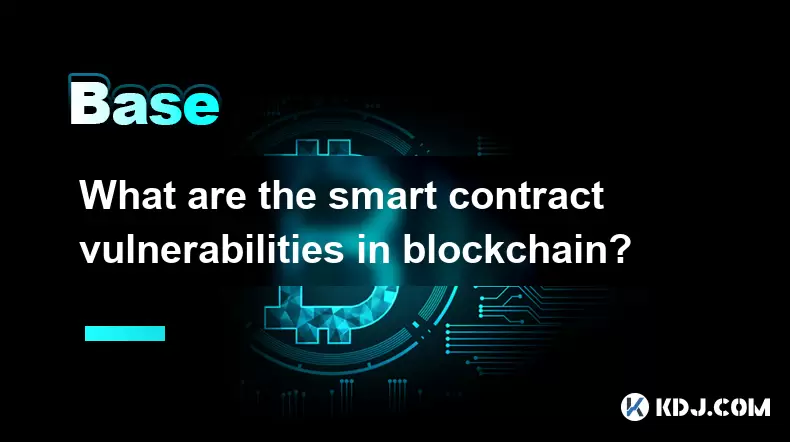
What are the smart contract vulnerabilities in blockchain?
Jun 13,2025 at 07:35pm
Introduction to Smart Contract VulnerabilitiesSmart contracts are self-executing agreements with the terms of the contract directly written into code. They play a crucial role in blockchain ecosystems, especially on platforms like Ethereum. However, despite their benefits, smart contracts can contain vulnerabilities that attackers exploit for malicious ...

What is a replay attack? How does blockchain prevent this risk?
Jun 13,2025 at 07:57am
Understanding the Concept of a Replay AttackA replay attack occurs when a malicious actor intercepts and retransmits valid data communications to deceive systems into accepting them as legitimate. In the context of digital transactions, this typically involves capturing a valid transaction and resubmitting it without authorization. The goal is often to ...

What is OTC trading in cryptocurrency? Which investors are suitable?
Jun 13,2025 at 01:36am
Understanding OTC Trading in CryptocurrencyOTC (Over-The-Counter) trading in cryptocurrency refers to the direct, private exchange of digital assets between two parties without using a centralized exchange platform. Unlike traditional exchange-based trading where buyers and sellers are matched publicly, OTC trades occur off-exchange and are typically fa...
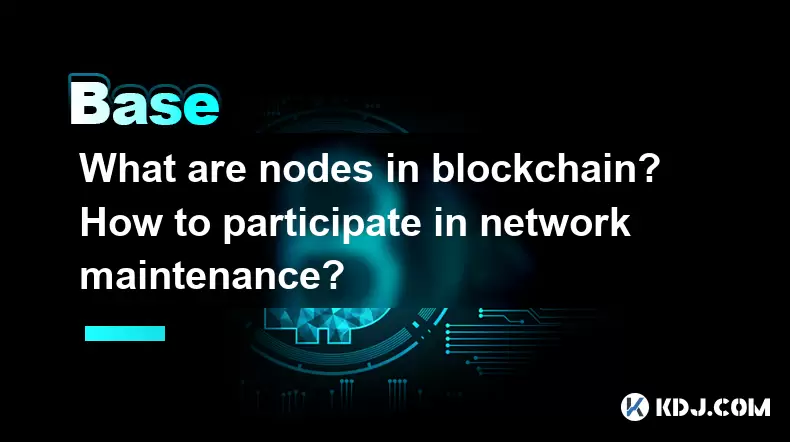
What are nodes in blockchain? How to participate in network maintenance?
Jun 10,2025 at 09:35pm
Understanding Nodes in BlockchainIn the realm of blockchain technology, nodes serve as the foundational building blocks that enable decentralized networks to function. A node is essentially a device—often a computer or server—that participates in the network by storing and validating data. Each node contains a copy of the entire blockchain ledger, ensur...

What does lock-up mean in cryptocurrency? What are the risks and benefits?
Jun 10,2025 at 08:49pm
Understanding Lock-up in CryptocurrencyIn the world of cryptocurrency, the term lock-up refers to a mechanism where a certain amount of tokens or coins are temporarily restricted from being sold, transferred, or withdrawn. This period is typically pre-defined and agreed upon during events such as initial coin offerings (ICOs), token sales, or through sm...
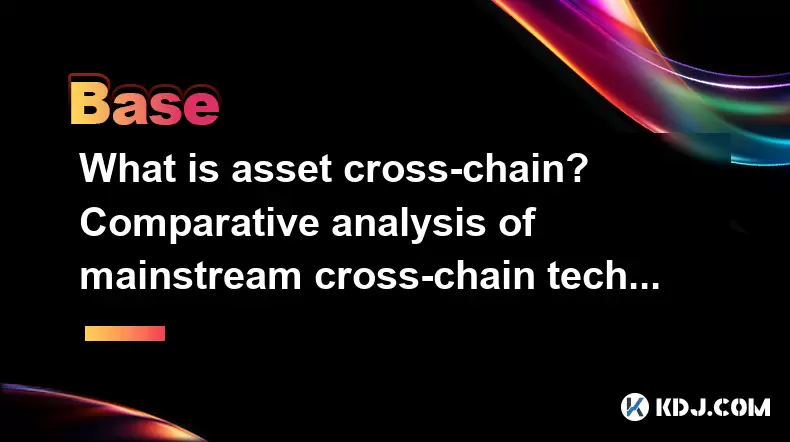
What is asset cross-chain? Comparative analysis of mainstream cross-chain technologies
Jun 11,2025 at 08:09pm
Understanding the Concept of Asset Cross-ChainAsset cross-chain refers to the technology and mechanisms that allow digital assets from one blockchain network to be transferred or utilized on another blockchain network. This process enables interoperability, which is crucial in a multi-chain ecosystem where different blockchains serve various purposes, s...

What are the smart contract vulnerabilities in blockchain?
Jun 13,2025 at 07:35pm
Introduction to Smart Contract VulnerabilitiesSmart contracts are self-executing agreements with the terms of the contract directly written into code. They play a crucial role in blockchain ecosystems, especially on platforms like Ethereum. However, despite their benefits, smart contracts can contain vulnerabilities that attackers exploit for malicious ...

What is a replay attack? How does blockchain prevent this risk?
Jun 13,2025 at 07:57am
Understanding the Concept of a Replay AttackA replay attack occurs when a malicious actor intercepts and retransmits valid data communications to deceive systems into accepting them as legitimate. In the context of digital transactions, this typically involves capturing a valid transaction and resubmitting it without authorization. The goal is often to ...

What is OTC trading in cryptocurrency? Which investors are suitable?
Jun 13,2025 at 01:36am
Understanding OTC Trading in CryptocurrencyOTC (Over-The-Counter) trading in cryptocurrency refers to the direct, private exchange of digital assets between two parties without using a centralized exchange platform. Unlike traditional exchange-based trading where buyers and sellers are matched publicly, OTC trades occur off-exchange and are typically fa...

What are nodes in blockchain? How to participate in network maintenance?
Jun 10,2025 at 09:35pm
Understanding Nodes in BlockchainIn the realm of blockchain technology, nodes serve as the foundational building blocks that enable decentralized networks to function. A node is essentially a device—often a computer or server—that participates in the network by storing and validating data. Each node contains a copy of the entire blockchain ledger, ensur...

What does lock-up mean in cryptocurrency? What are the risks and benefits?
Jun 10,2025 at 08:49pm
Understanding Lock-up in CryptocurrencyIn the world of cryptocurrency, the term lock-up refers to a mechanism where a certain amount of tokens or coins are temporarily restricted from being sold, transferred, or withdrawn. This period is typically pre-defined and agreed upon during events such as initial coin offerings (ICOs), token sales, or through sm...

What is asset cross-chain? Comparative analysis of mainstream cross-chain technologies
Jun 11,2025 at 08:09pm
Understanding the Concept of Asset Cross-ChainAsset cross-chain refers to the technology and mechanisms that allow digital assets from one blockchain network to be transferred or utilized on another blockchain network. This process enables interoperability, which is crucial in a multi-chain ecosystem where different blockchains serve various purposes, s...
See all articles
























